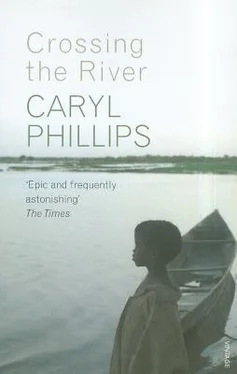Caryl Phillips - Crossing the River
Здесь есть возможность читать онлайн «Caryl Phillips - Crossing the River» весь текст электронной книги совершенно бесплатно (целиком полную версию без сокращений). В некоторых случаях можно слушать аудио, скачать через торрент в формате fb2 и присутствует краткое содержание. Год выпуска: 2006, Издательство: Vintage, Жанр: Современная проза, на английском языке. Описание произведения, (предисловие) а так же отзывы посетителей доступны на портале библиотеки ЛибКат.
- Название:Crossing the River
- Автор:
- Издательство:Vintage
- Жанр:
- Год:2006
- ISBN:нет данных
- Рейтинг книги:4 / 5. Голосов: 1
-
Избранное:Добавить в избранное
- Отзывы:
-
Ваша оценка:
- 80
- 1
- 2
- 3
- 4
- 5
Crossing the River: краткое содержание, описание и аннотация
Предлагаем к чтению аннотацию, описание, краткое содержание или предисловие (зависит от того, что написал сам автор книги «Crossing the River»). Если вы не нашли необходимую информацию о книге — напишите в комментариях, мы постараемся отыскать её.
Crossing the River — читать онлайн бесплатно полную книгу (весь текст) целиком
Ниже представлен текст книги, разбитый по страницам. Система сохранения места последней прочитанной страницы, позволяет с удобством читать онлайн бесплатно книгу «Crossing the River», без необходимости каждый раз заново искать на чём Вы остановились. Поставьте закладку, и сможете в любой момент перейти на страницу, на которой закончили чтение.
Интервал:
Закладка:
Six weeks ago we set out across the open prairie, dust clouds rising, the noonday sun at full strength, a party of seventy colored people walking to the side of our wagons. The wagons were drawn by six oxen trained to work in pairs, animals which have a tendency to skittishness, and as such they initially frightened me. The first and rear wagons were attended to by experienced drivers, but the rest were handled by we pioneers. The idea was that I should cook for all those without family, mainly bullwhackers, all men, and this I tried to do, rustling up bacon and salt pork and any game or beast that the men might happen to shoot along the way. I made sure each wagon had ample amounts of flour, sugar, coffee and rice, and a plentiful supply of ten-gallon water kegs. Other provisions and equipment in my charge included vinegar, soap, matches, cooking utensils and field stoves. But it was never easy. Before dawn, the freezing wind ripped through our clothing and right into the marrow. At noon, and early in the afternoon, the sun often caused us serious discomforts, made worse by the type of clothing that we wore. Heavy pants and flannel shirts for the men, and high-necked, long-sleeved, dark dresses that wouldn’t show the dirt for the women. At night, we drew the wagons into a circle, and camp fires were built, meals cooked, and tales told of white expeditions where cruelties were often inflicted upon colored men and women.
The wagon train soon settled into a routine where one difficult day seemed much like the next, and where there was no discernible change to the uniform landscape. However, I felt myself growing weaker, and I tried in vain to diguise my ailments. Some days we covered ten miles across the dry grass, some days twelve or fifteen, depending upon repairs or the weather. We saw Indians, and I felt some sympathy with them, but the Indian bands kept their distance and watched, choosing not to make anything of their encounters with the dark white men. Except on one occasion, when a column of a dozen warriors, at their head a chief, rode out towards the train. Behind them came the squaws, some with papooses slung across their backs, and all around them yapped pitiful-looking dogs who would in time become food. The chief halted, as did the wagon train, and he dismounted. By means of facial expressions and gestures, he made it known that we could pass in peace. I watched as our leader rewarded him with sugar and tobacco, and he in turn was rewarded with grunts of approval. Our only other visitors were the dark, shaggy buffalo who moved at such a slow pace that it was difficult to make out their progress. Our leader, forbade the men, who were tiring of my pork, to stalk and hunt these monsters, informing them that should they be spooked and stampede, they would happily trample all before them. The occasional deer or game bird was the only alternative to that which we carried aboard the wagons.
Ten days ago, the river source began to dwindle to a mere trickle, and water was severely rationed. I watched the oxen pulling the enormous loads with heroism, and I witnessed the equally impressive bravery of the pioneers who, dehydrated as they were, energy flowing back and forth, still managed to pursue the torture. My own state became perilous, racked as I was with exhaustion, but still I managed to keep my misery to myself. Until yesterday. When it became clear that I was unable to prepare any more meals. I had long since been relieved of laundry duties, owing to the water rationing, and I had occasionally begged a ride on a wagon while all others walked. But then, this final humiliation. Yesterday morning, under the dazzling, intense blue of the Colorado sky, the foothills of the Rockies in the distance, this frustrated man sat before me with a stern face and shared with me his water ration. Suddenly, and without warning, his face softened and he spoke. ‘Today and tomorrow you will rest, Martha. Ride in Jacob’s wagon on the flour sacks. Tomorrow evening we shall speak again.’ He took my hand with what I imagined to be real affection.
‘Well?’ This is his beginning. I know what will follow. ‘You must find some shelter, for you will never survive the journey to California.’ I say nothing. The sun finally disappears beneath the horizon. I look across to the large fire where they are preparing the evening meal. Six weeks ago, I was one of them. But times have changed. Still, I cherish these brave people — these colored pioneers — among whom I travel. They took upon themselves this old, colored woman and chose not to put her down like a useless load. Until now. ‘Tomorrow, Martha.’ I nod, unable to find the words to convince him that he must not feel guilty. None of them should. I am grateful. That is all. I am simply grateful. I smile at this man who is young enough to be my son. ‘Thank you,’ he says. He turns away before one of us discovers words that are best left undisturbed.
At dawn, they bear me like a slaughtered hog up and into the back of a wagon. But first they have cleared out some supplies to make room for me. Other wagons will bear the burden of carrying these provisions. He approaches and tells me that I will be taken to Denver, which lies some miles off their course. If I leave now, I may reach by sunset, which will give the wagon a chance to rejoin the group within two days. It is still cold. He offers me an extra blanket, which I take. We are to peel off from the main group, myself and two men, and strike out alone. He tells me that I have nothing to be afraid of. God willing, he hopes one day to find me in California. I thank him. All about me the pioneers stir. Sunken-eyed, still tired. I nursed and fed many of them through the first trying days, forcing food and water down their throats, and rallying them to their feet in order that they might trudge ten more miles towards their beloved California. Once there, they all dream of tasting true freedom, of learning important skills, of establishing themselves as a sober and respectable class of people. This is their dream. My weakness will delay them no longer. I hear the snap of a whip, and the driver yelling a sharp, impatient phrase to his oxen. As we move off, the tears begin to course down my old face.
We pass into a town on whose outskirts stand log cabins, some finished, some unfinished, but clearly being attended to. The town is growing. As we journey on, I see stores, rooming houses and saloons. But I see only two people. Indians. I remember the day the colored troops of Leavenworth paraded Indian scalps, fingers with rings attached, and ears that had been pulled clean off. They behaved like the men whose uniforms they wore. And now the Indians disappear from view. Up here in the Rockies, my breath is short and I gasp for air. I lie back down, but cannot rediscover my previous position. And then the wagon shudders to a halt, and one of my fellow pioneers appears before me. ‘This is Main Street, Miss Martha.’ I look at him as he pulls his collar tight up under his chin. Behind him the wind is rising, and the sky is beginning to darken. ‘We’re under instructions to set you down right here and high-tail it back to the others.’
In the pre-dawn hours of an icy February morning, Martha opened her eyes. Outside it was still dark, and the snow continued to spin. A dream began to wash through her mind. Martha dreamed that she had traveled on west to California, by herself, and clutching her bundle of clothing. Once there she was met by Eliza Mae, who was now a tall, sturdy colored woman of some social standing. Together, they tip-toed their way through the mire of the streets to Eliza Mae’s residence, which stood on a fine, broad avenue. They were greeted by Eliza Mae’s schoolteacher husband and the three children, who were all dressed in their Sunday best, even though this was not Sunday. A dumbstruck Martha touched their faces. Eliza Mae insisted that her mother should stay and live with them, but Martha was reluctant. All was not right. There was still no news of Lucas, and her Eliza Mae now called herself Cleo. Martha refused to call her daughter by this name, and insisted on calling her a name that her children and husband found puzzling. Soon it was time for Martha to leave, but her daughter simply forbade her mother to return east. Martha, feeling old and tired, sat down and wept openly, and in front of her grandchildren. She would not be going any place. She would never again head east. To Kansas. To Virginia. Or to beyond. She had a westward soul which had found its natural-born home in the bosom of her daughter.
Читать дальшеИнтервал:
Закладка:
Похожие книги на «Crossing the River»
Представляем Вашему вниманию похожие книги на «Crossing the River» списком для выбора. Мы отобрали схожую по названию и смыслу литературу в надежде предоставить читателям больше вариантов отыскать новые, интересные, ещё непрочитанные произведения.
Обсуждение, отзывы о книге «Crossing the River» и просто собственные мнения читателей. Оставьте ваши комментарии, напишите, что Вы думаете о произведении, его смысле или главных героях. Укажите что конкретно понравилось, а что нет, и почему Вы так считаете.












